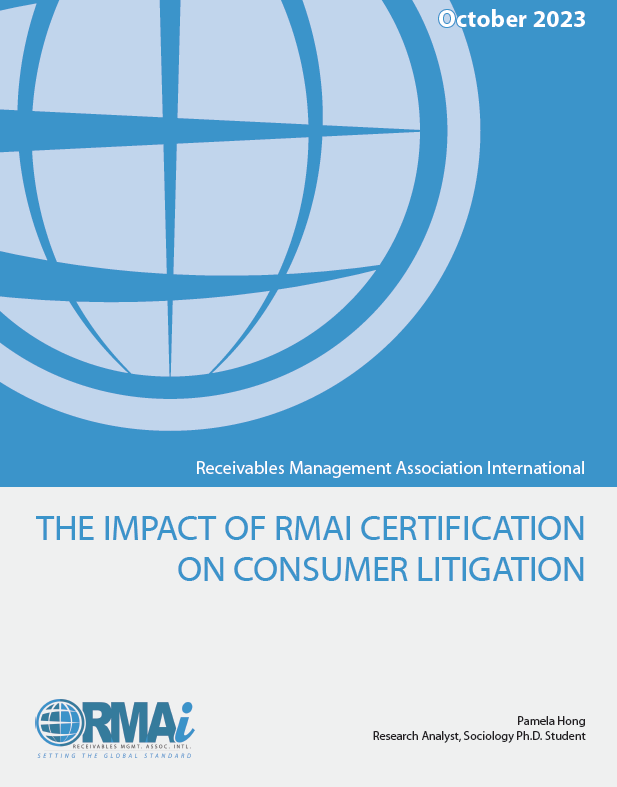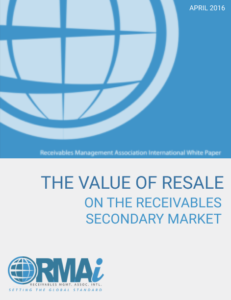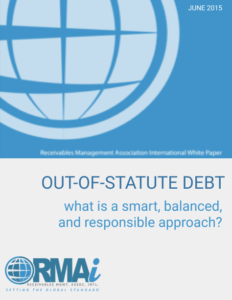RMAI publishes white papers and educational resources on various receivables management industry topics including the RMAI Receivables Management Certification Program, asset classes, and more.
View Sponsored White Papers here.

Understanding the Consumer, Products and Process Challenges for Debt Buyers in Alternative Fintech Markets (April 2024)
Alternative lenders have been essential in providing financial services access to the under-banked through online lending. This paper includes an exploration of who makes up the alternative lending industry and the types of products they offer, and issues concerning the purchase of alternative lending products.

Leveraging Artificial Intelligence and Machine Learning ( February 2024)
While the current hot topics regarding artificial intelligence (AI) and machine learning focus on how these cutting-edge technologies can help streamline operations in the debt buying and debt collection space, an area worth emphasizing is how to be mindful of the data privacy implications of these tools, and also how they can be used to bolster consumer protection.

A Simple Guide to Safeguarding Artificial Intelligence/ Machine Learning Practices (February 2024)
Artificial intelligence (AI) and its subpart, machine learning (ML), have become integral components of numerous industries, offering solutions that were once deemed impossible. However, with great power comes great responsibility. It’s essential to approach these technologies cautiously, ensuring their implementation aligns with ethical and practical standards. This paper provides a place to start when building precautions and best practices for utilizing AI/ML.

Understanding Fintech Chain of Title (November 2023)
Fintech loans are typically originated by one of a handful of state or nationally charted banks. After origination, the originating bank may transfer the loans to the servicer or an investor, and then the servicer may repackage and sell the loan again through securitizations. Due to this often-complicated structure, as well as the fact that such structures may differ from one fintech relationship to the next, it is important that buyers understand the fintech servicer’s funding structure, any transfer of ownership of a loan after its origination, and how the seller documents those transfers.

Demystifying the Different Types of Artificial Intelligence and Machine Learning (November 2023)
In the era of rapid digital transformation, artificial intelligence (AI) and machine learning (ML) have emerged as potent tools to solve complex problems, make sense of enormous amounts of data, and drive technological innovation. These systems have become pervasive and under the watchful eye of businesses and regulators. Given these tools’ widespread use and transformational potential, this paper aids in understanding the different types of AI and ML, their capabilities, and their limitations.
The Impact of RMAI Certification on Consumer Litigation (October 2023)
The Receivables Management Association International (RMAI) conducted a before-and-after audit analysis of Receivables Management Certification Program (RMCP or certification program) certified business between 2019 and 2022. This is an extension and replication of the analysis RMAI conducted in July 2019. The findings show that after an RMCP audit, litigation against RMAI’s certified businesses that had passed an audit decreased an average of 25.5% in the four-year span of the analysis.
Infographic on the Impact of RMAI Certification on Consumer Litigation
Implementing Diversity Equity Inclusion Best Practices RMAI Diversity Equity Inclusion Program Baseline Recommendations (February 2023)
This companion guide to the January 2022 Consumer Financial Protection Bureau (CFPB) Report on Diversity and Inclusion within Financial Services identifies the foundational areas of a Diversity Equity Inclusion (DEI) program as well as additional steps RMAI member companies can take to establish and mature their DEI initiatives. This guide is designed for companies that are just building out their DEI efforts as well as those that are refining their well-established DEI program. The RMAI DEI Task Force prepared this resource to help RMAI member companies implement the CFPB’s best practices and recommendations for organizations based on size.
An Overview of Bankruptcy for the Accounts Receivables Management Industry (January 2023)
Within the ever-changing world of recovery management, bankruptcy cases and account management require a specialized understanding of the complexities involved with minimizing risk while maximizing cash recovery. Maintaining a comprehensive strategy for default credit and collections and implementing best practices with respect to handling bankruptcy receivables in an efficient and compliant manner is imperative. This paper is intended to de-mystify bankruptcy in a manner that will benefit originators, debt buyers and servicers of all types of debt in enhancing internal operations, optimizing a bankruptcy outsourcing strategy or implementing a bankruptcy debt sale strategy. The Bankruptcy Working Group was responsible for creating An Overview of Bankruptcy for the Accounts Receivables Management Industry, and the effort was led by Al Hochheiser, MauriceWutscher LLP; Rory Liebhart, LCI Bankruptcy Services; and Rui Pinto-Cardoso, Quantum3 Group, LLC.
Maximizing Your RMAI Membership – How to Make the Most Out of Your RMAI Experience (January 2023)
RMAI has developed top-notch programs, including the RMAI Certified Receivables Management Certification Program, and in-person events featuring education and networking, as well as exclusive member-only communications, educational and informative papers, and live and recorded educational webinars. Whether you just joined RMAI, are a long-time member, or are considering joining, the information can help you get the most of your RMAI membership. The RMAI Membership Committee developed this resource to encourage your involvement.
The Purchase, Sale, and Collection of the Fintech Asset Class (July 2022)
The area where financial service products and technology merge is popularly referred to as fintech. Fintech lending has experienced significant growth in the last several years, leading to an increase in nonperforming accounts. Fintech lenders are turning to the receivables management industry for contingency collections and portfolio debt sales. To better understand this asset class, its characteristics, opportunities, and unique issues as it relates to collections, the RMAI Fintech Legal Working Group, formed in 2021, developed this primer.
Understanding the Receivables Management Industry: A Guide to Key Concepts, Terms and Acronyms (April 2022)
This educational resource is designed for receivables management industry employees and others who want to learn about the receivables management industry. The guide is a user-friendly reference to common receivables management terms and acronyms; an exploration of the life cycle of a debt in collection; explanations of the different business models within the industry, how they differ, and the type of debt they collect; federal and state laws regulating the industry; and licensing information.
The Value of Resale on the Receivables Secondary Market (April 2016)
Consumers, businesses, and the government all rely on the availability and extension of credit to purchase goods and services. This White Paper will share the important role that “account receivables” play in a credit-based economy and the risks associated with prohibiting the marketability of title on the secondary market.
Out-of-Statute-Debt: What Is a Smart, Balanced, and Responsible Approach? (June 2015)
Out-of-statute debt (OSD) has received considerable attention. This report provides an analysis of the debt buying and collection industry and looks, in particular, at three aspects of the out-of-statute debt issue: (1) the law related to OSD; (2) the adverse public policy consequences of a ban on the collection OSD; and (3) RMAI’s recommendations for OSD collection reform.
The Debt Buying Industry (April 2015)
The debt buying industry is a critically important segment of the nation’s credit-based economy. This white paper explains the industry, the economic benefits that are returned to originating creditors and consumers, the regulatory framework in which the industry operates, recent state regulatory trends, and RMAI’s Debt Buyer Certification Program.









